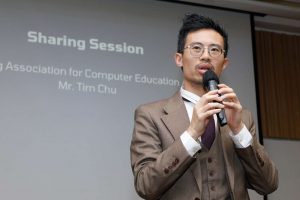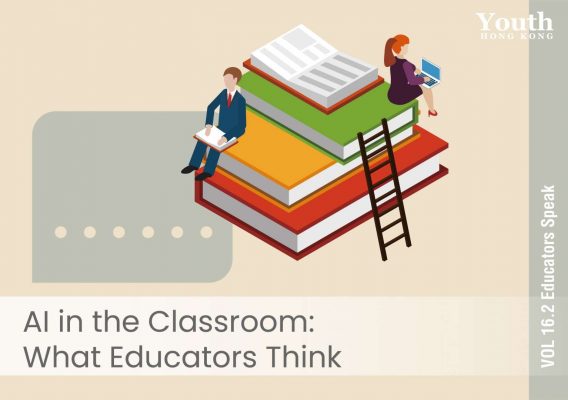//16.2 Educators’ Speak
AI in the Classroom: What Educators Think
Four educators are on the whole supportive of AI in learning, yet they also urge caution and thoughtful implementation.
Chu Tsz-wing
 Director of SH School Development & Chief Headmaster of St. Hilary’s Primary Section
Director of SH School Development & Chief Headmaster of St. Hilary’s Primary Section
“AI in education is inevitable, but how do we prevent our overreliance on it?”
We recognise that the emergence of AI is irreversible, and this aligns with our educational goals: that education is about equipping children for the future. If we anticipate that society will rely on AI applications, then it is imperative that we properly introduce AI to students today, so they are well-prepared for the future.
Our school has been systematically introducing AI into our operations since March 2023. We use AI to assist in administrative tasks, such as generating parent notices, replying to parent letters, and writing teacher comments on student performance. We also have a school-based AI application database, where each subject teacher or group leader records their application experiences in a system for teachers to refer to and learn from each other.
To help teachers understand AI, we held a development day to learn about the operation and underlying principles of generative AI, where, through small group workshops, teachers from various subjects gathered together to explore how to incorporate AI into their teaching.
We will launch the St. Hillary’s AI Explorer programme for Grades 1 to 6 from September 2024. G1 to G3 students will have one lesson every two weeks, while it will be weekly for G4 to G6 students. We will focus on teaching students the application of AI on their work, providing them with opportunities to visit organisations that utilise AI tools.
I am not overly concerned about students being unable to understand AI. Rather, my concern lies in teachers becoming overly reliant on AI, whereby they can quickly generate large amounts of drill-style exercises or worksheets for students. This approach only further promotes a culture of rote learning.
I am also concerned about homework. Many people argue that if students use AI to complete their homework, learning objectives will be lost. However, the fact is that most homework involves simply copying information from textbooks onto worksheets. Whether students use AI, textbooks, or search engines to find information, there really is no significant difference.
Therefore, as educators, we should focus on teaching students how to effectively use AI as a tool to enhance their learning and problem-solving abilities, rather than relying on it to complete tasks for them. Only with a comprehensive AI education from a young age, will they be able to navigate and thrive in a world increasingly shaped by AI.
Betty Cheng
 President of FlipEdu HK
President of FlipEdu HK
“AI literacy is an essential competency. We must, therefore, foster a responsible and informed approach to its use.”
I can see how incorporating Generative AI technology significantly enhances teaching and learning. I have used AI to generate an article on the same theme when teaching poetry, which allows students to compare and contrast it with the original, not only enriching the learning experience, but also sharpening their sensitivity to different textual styles and interpretations.
AI is a powerful ally in promoting creativity and inclusivity. In literature, students are encouraged to use multimodal approaches to express their ideas, catering to diverse learning styles and preferences. For more reserved people, AI-powered tools like virtual presenters, enable them to craft and share their stories comfortably leading to a more inclusive learning environment. Even ChatGPT, as a personal tutor, offers a non-judgmental, always-available resource where students can inquire and explore knowledge freely, enhancing their learning autonomy and engagement.
There is a legitimate concern about students potentially misusing AI tools to complete assignments without genuine understanding, bypassing critical thinking processes. This challenge underscores the necessity of designing learning tasks that integrate AI ethically and enhance educational outcomes.
We cannot stop the progression of AI technology, and it is clear that AI literacy is an increasingly essential competency. As educators, it is our responsibility to model the ethical use of AI, demonstrating its potential to transform learning, while addressing its pitfalls. We can mitigate risks and maximise benefits by redesigning learning tasks and creating safe, structured environments for AI use. By fostering a responsible and informed approach to AI use, we ensure it is a valuable tool for educational advancement rather than a shortcut that undermines learning integrity.
Chu Ka-tim
 Principal of Shatin Pui Ying College
Principal of Shatin Pui Ying College
Chairman of Hong Kong Association for Computer Education
“AI is just a tool. We shouldn’t forget our uniqueness as humans.”
We use AI for administrative and learning tasks; from writing notices to parents, compiling exercises and exams, marking, setting lesson plans or even providing insight on school decision-making. Students are encouraged to use AI to formulate an idea, refine their answer and then generate photos to illustrate their concepts.
The ethical considerations of using AI figure heavily in our school and we cover this often in school assemblies, morning sharing or class periods. We also try to teach students that AI has its limits and is just a tool. The important point is who is using it. I never stop reminding the students of our human uniqueness where we can be creative, empathic and collaborative.
A worry that I constantly have is how, with technology constantly and rapidly changing, how can we – let alone students – keep up?
Kam Wai-ming
 Principal of HKSKH Bishop Hall Secondary School
Principal of HKSKH Bishop Hall Secondary School
“With a changing landscape of AI, adaptive learning must benefit students.”
While AI presents immense opportunities, it is not without controversies. Generative AI, renowned for its various capabilities, has faced debates and initial bans in universities due to issues like plagiarism and copyright infringement. It is imperative to educate students about the role of AI as a tool, emphasising that it should not replace genuine learning experiences. By promoting AI in education, we can instil a mindset of lifelong learning, encourage students to become self-directed learners, foster critical thinking, and empower students to make informed and ethical choices in the evolving technological landscape. ■


